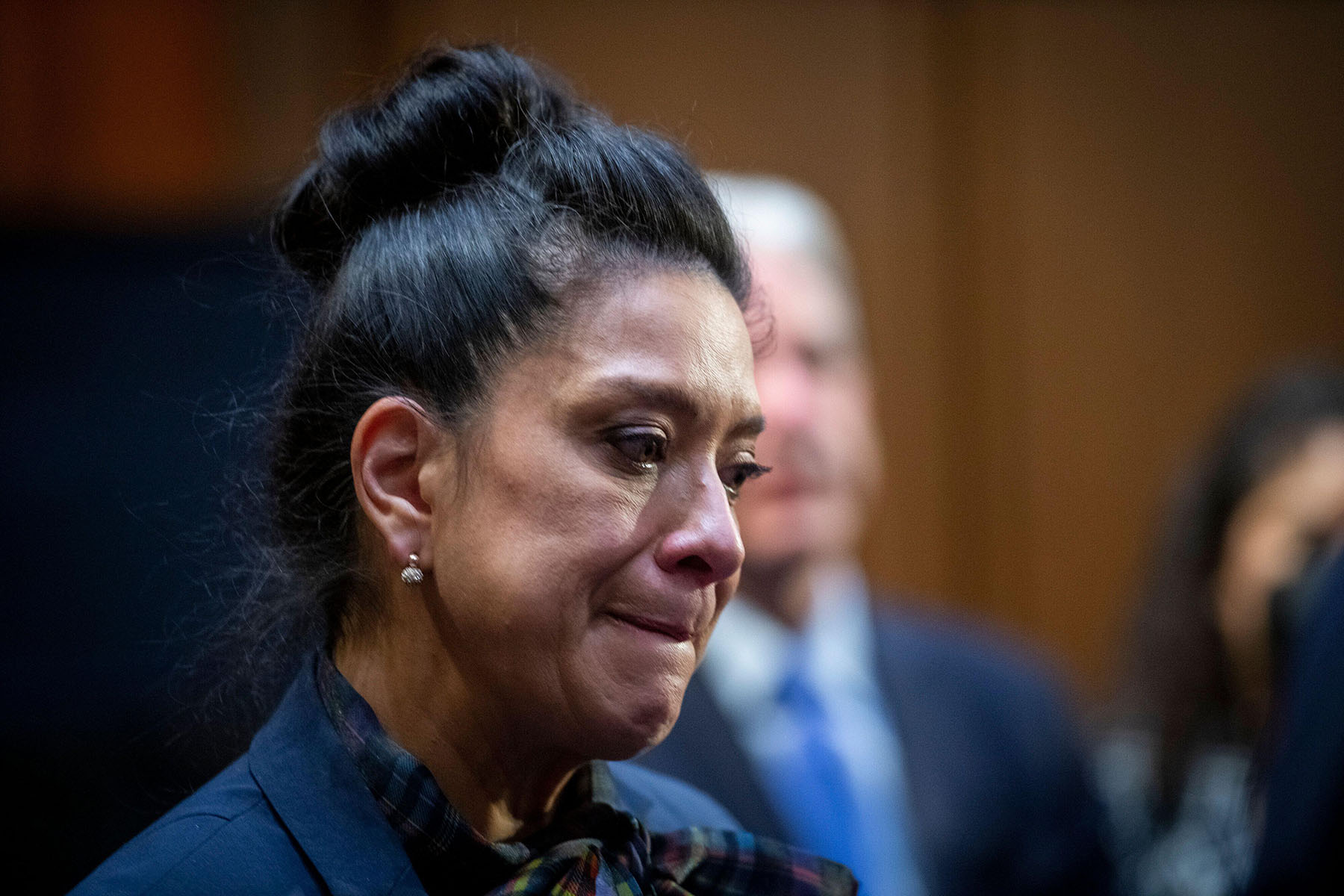President Donald Trump’s new administration has reignited conversations about the safety of judges, as threats and instances of violence against them increase annually. In the first three months of his second term, the president and his associates have singled out multiple federal judges by name, questioning both their credentials and calling for them to be impeached.
Women judges, including those who have experienced violent attacks first hand, are working to sound the alarm on solutions to better protect judges at all levels of government.
“In order to do our jobs, we have to feel safe,” Julie Kocurek, a Travis County district judge in Texas who survived a 2015 attack, told The 19th. “We have to be able to hold the rule of law and not feel fearful. It goes to the core of our legal system and our democracy.”
Kocurek declined to comment on the Trump administration specifically and wanted to keep the conversation nonpartisan. She added that she feels the climate of hate against judges has worsened over the last decade, which she attributes in part to social media emboldening people.
Ten years ago, Kocurek was shot and seriously injured in her home driveway while with her son. Her attacker was a defendant who had been charged with tax fraud.
“I had been a judge for 16 years and never imagined that something like this would happen,” Kocurek said. “I was in the hospital for 40 days. I almost died from an infection, and had 26 surgeries while I was in the hospital. My immediate family did not want me to go back to work at all. But, you know, I soon realized that this was not about me personally. It was about my work, and I had to go back to work to show that violence will not prevail over the law and judges cannot be intimidated.”
Since that time, Kocurek successfully advocated for a court security bill in Texas, testified before Congress and detailed her experiences in an interview with “48 Hours.” Kocurek isn’t the only one.
In the last several weeks, Esther Salas, a U.S. district court judge in New Jersey, has appeared on national news programs warning that public officials, including judges, are dealing with “unprecedented attacks in the form of intimidation.” In 2020, Salas’ 20-year-old son Daniel was fatally shot at their family home. The suspect was a lawyer who described himself as an “anti-feminist,” and had appeared before Salas in court concerning his lawsuit challenging the military’s male-only draft. He was later found dead.
This month, about a dozen pizzas delivered to other judges’ homes named Salas’ murdered son Daniel as the sender of the order.
“I’ve often talked about the violence against the judiciary being a barn fire that’s been burning for some time, but it feels like people in positions of power, leadership, people with large social platforms, are throwing fuel on this fire and lumber on this fire and accelerant,” Salas said in an interview last week with ABC News’ Linsey Davis. Salas’ office did not respond to interview requests from The 19th.
Violence against judges is not exclusive to women in the profession, and multiple men have been killed in connection with their positions in public office. Figures from the U.S. Marshals Service indicate that serious threats against federal judges more than doubled between the end of fiscal year 2021 and the end of fiscal year 2023. The agency’s 2024 annual report states that while the number and intensity of threats has increased, the number of investigations conducted into threats has decreased. The report did not explain why.
In response to a request from The 19th asking for a breakdown of gender differences in the number of threats, the agency’s office of public affairs stated it did not have any additional data to provide.
Despite the data gaps, Kocurek said that the information she has received over the years suggests that women judges are more vulnerable to violent attacks.
“Especially in the criminal courts, because we handle family violence cases, where it’s predominantly men assaulting their wives or their intimate partners,” Kocurek said. “They are only starting to collect that data, but the data is showing that, yes, it is happening more against women judges than men.”
Beyond the judiciary, data capturing instances of political violence against women in public office more broadly is also limited. It is a new area of research about “four to five years old,” said Nadia E. Brown, professor of government and chair of the women’s and gender studies program at Georgetown University. Brown said that in her research she finds that women in public office tend to view threats against them as one-offs rather than as a systemic pattern. Women also may not view more subtle threats against them under the umbrella of political violence, she added.
“My co-author, Paru Shah, and I have done around like 32 interviews with women of color mayors, and they’ve all said things like, ‘Well, I don’t consider this political violence,’ but then they’ve gone on to list some egregious, horrible things. Then, as they are talking to us about it, they’re like, ‘Oh, yeah, maybe that was political violence,’ You hear them processing this in real time,” Brown said.
Kocurek, Salas and others are identifying ways to address these issues.
On April 15, Salas participated in a virtual Zoom panel called Speak Up For Justice. She encouraged the thousands of legal professionals watching to join what she described as a “civics education movement” she said is being led by U.S. District Court Judges Landya B. McCafferty in New Hampshire, Beth Bloom in the Southern District of Florida and Robin L. Rosenberg, also in the Southern District of Florida.
Separately, the federal judiciary has created a task force that will consider how to address risks facing federal judges, according to reporting from The New York Times.
Following Kocurek’s attack in 2015, the Texas legislature passed a bipartisan court security bill signed by the governor in 2017. Kocurek said that her attack highlighted gaps in how security threats are reported, in data collection and in access to security personnel for judges.
Data collected as a result of the law showed that from 2018 to 2023 there were 522 general threats on judicial officers in Texas, 29 assaults and 68 bomb threats, Kocurek said. The law also prompted the state to create a court security division supported by a U.S. Marshal who helps judges with security assessments and best practices. In Michigan, a judicial security act is currently making its way through the legislature to ensure that state judges have the same protections currently provided to federal judges, including limits on the personal information publicly posted about them.
Last year in Congress, a bipartisan group of senators introduced the Countering Threats and Attacks on Our Judges Act that aims to establish an intelligence and resource center to monitor threats against state and local judges and court personnel, as well as provide technical assistance, training, physical security assessments and guidance on court security. The bill was passed by the U.S. Senate in June 2024, but stalled in the House.
Kocurek said that she is hopeful that this bill will be passed and signed this year.
“It’s kind of therapeutic, helping people, using my experience to help others,” Korcurek said. “It makes me feel like it didn’t happen for nothing, or like I’m doing something with it. I told my son from the beginning, ‘We are not going to let this define us. We will define our story and what this will be used for.’”






